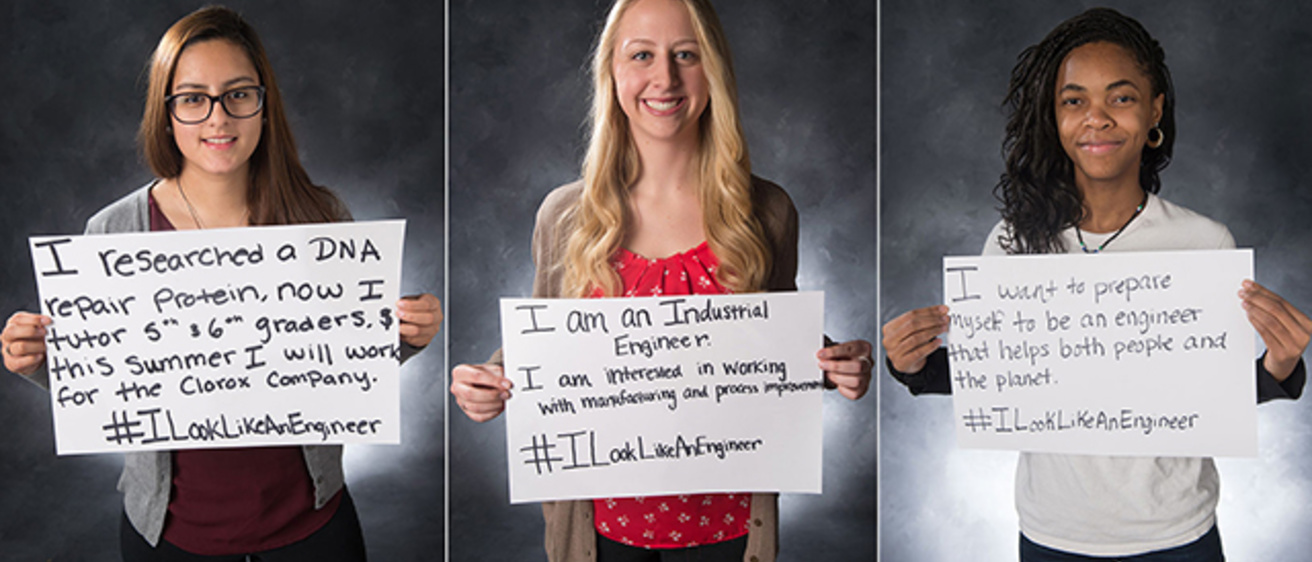There's something special about the University of Iowa's College of Engineering—especially for its growing population of female students and faculty.
Consistently above the national average for female engineering student enrollment, the UI program's unique small-college atmosphere at a Big Ten university, its research opportunities in the health sciences, and its emphasis on collaboration over competition are among the top reasons administrators and students say women choose to study here.
According to college administrators, women make up more than 26 percent of overall engineering enrollment at the UI, compared to an average of about 20 percent at engineering colleges nationwide. And more than 29 percent of students in the UI College of Engineering’s fall 2015 freshman class were female.
Rachel Hageman, a junior industrial engineering major from Dixon, Illinois, says she came to the UI because of the tight-knit group of students she met when she visited campus as a prospective student.
“I liked that the college is relatively small compared to the rest of campus,” Hageman says. “You really get to know your professors and everyone in your class.”
Mariama Corneh, a junior mechanical engineering major from Des Moines, says the UI had the best recruiting program of the engineering colleges she visited.
“At the UI, it was a more personal experience,” Corneh says. “Instead of saying ‘everyone comes here, so why don’t you?’ we talked about the wonders of engineering and what the university had to offer me beyond just academics.”
Corneh also credits her freshman Living-Learning Community for women in science and engineering as a big help in getting homework done and building strong social ties with her classmates.
Jane Dorman, director of admissions and first-year experience for the College of Engineering, says female students make the engineering program a better place for everyone. Because professional engineers spend a lot of time working in teams, Dorman says the opportunity to collaborate with people of different genders, races, and backgrounds helps students learn communication and teamwork skills that they will use throughout their careers.
In honor of Women’s History Month, meet eight female students and faculty members in the College of Engineering who are paving the way for future generations of female engineers:
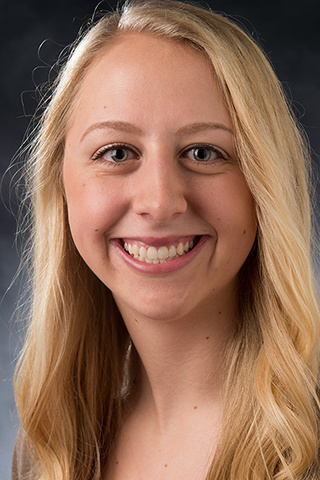
Rachel Hageman, junior, industrial engineering
Always up for a challenge, Rachel Hageman says she wants to be an industrial engineer because she enjoys working on large-scale problems with multiple layers.
“I like being able to organize problems and break them down; that’s what drew me to manufacturing,” she says. “If I can see how things interact with each other, then I can find out ways to eliminate waste in systems.”
In addition to her studies, Hageman talks to prospective students and their families as a student ambassador for the College of Engineering, has served on the executive board of the UI’s Society of Women Engineers, and plays intramural co-ed basketball at the UI and volleyball in a league in Coralville.
She is looking forward to her summer internship at Vermeer Corp. in Pella, Iowa, where she will work mainly with heavy machinery. She aspires to use her engineering skills to help businesses improve processes and efficiency.
Hageman’s advice for future female engineers: “Don’t be afraid to go out of your comfort zone because good things happen when you do.”
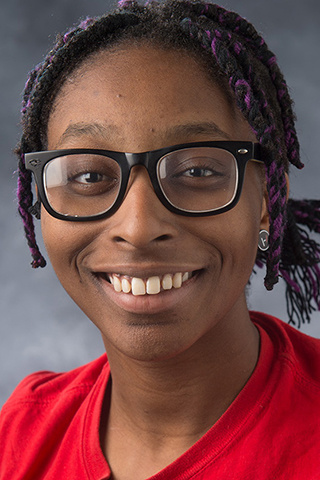
Tayo Oladele-Ajose, senior, biomedical engineering
Tayo Oladele-Ajose, from Mediapolis, Iowa, enrolled at the UI at age 15 after testing out of grades in middle school and high school. As an African American and female engineering student, Oladele-Ajose stands out among her peers. But she’s been able to build a strong community at the UI, getting involved in student government (she’s on the diversity committee and is head of the sustainability committee), working in a campus ophthalmology lab, and volunteering with the College of Engineering’s Black Girls Do Science camp.
“I’m interested in a lot of things,” she says. “I do a lot of volunteer work and go to a lot of events, so I’m connected to a lot of different and amazing people.”
A pre-med student, Oladele-Ajose switched from nursing to biomedical engineering because that’s where she found the most opportunity to specialize in her chosen field of ophthalmology. She says she loves studying engineering because she knows she will continue to use what she learns in class long after graduation.
Oladele-Ajose’s advice for future female engineers: “I would encourage any woman to speak up, and if you feel like your ideas aren’t being taken into account, don’t be disheartened; just keep putting it out there. Don’t be afraid to be assertive.”
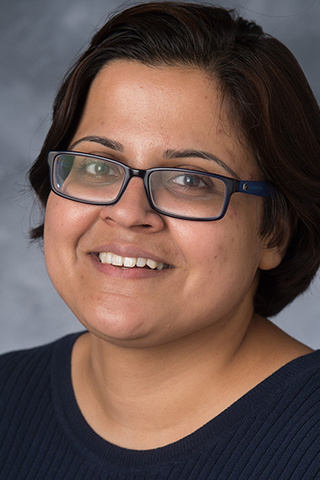
Fatima Toor, assistant professor, electrical engineering
With the support of a family of engineers, Fatima Toor was among the first class of engineering students to graduate from Smith College, a women’s college in Massachusetts.
Toor says she decided to study engineering because though she enjoyed math and physics, she realized those fields became more theoretical as they got more advanced. Engineering was exciting, she says, because the research had more tangible outcomes.
“I could not see myself working on something that no one would ever care about,” she said. “I really enjoyed the engineering program because I was building things and making a difference.”
At the UI, Toor is an assistant professor of electrical and computer engineering, physics and astronomy, and informatics. Her research is at the interface of applied physics and electrical engineering, designing devices that can either generate or detect light, with applications ranging from developing solar energy to building cheaper and noninvasive biomedical diagnostics.
Toor’s advice for future female engineers: “Girls need to know that engineers can do positive things. Women tend to like fields where they can help society; engineers can do that and do that often—they just do it in the background.”
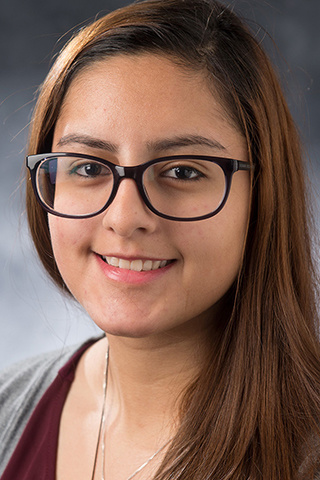
Andrea Diaz, junior, chemical engineering
Andrea Diaz was first encouraged to pursue science by her seventh-grade teacher, who invited students to conduct science experiments after school. In high school, she joined the science team.
At the suggestion of a few science teachers and her guidance counselor, Diaz, who is from Melrose Park, Illinois, decided to enroll in an engineering program in college. She says she chose the UI because she didn’t want to feel like a number.
“What I really liked about Iowa is that the professors valued you as a person,” she says. “I like feeling like I’m valued as an individual.”
Now in her junior year, Diaz is taking a year off from doing research to focus on her coursework and to work with diversity programs in the College of Engineering, where she helps encourage young minority students to love and excel in STEM pursuits. She is also president of the UI’s Society of Hispanic Professional Engineers.
Diaz’s advice for future female engineers: “If you like science and you enjoy it and you enjoy being challenged and being innovative, this is definitely the career to choose. It’s your career; it’s not a boy’s field.”
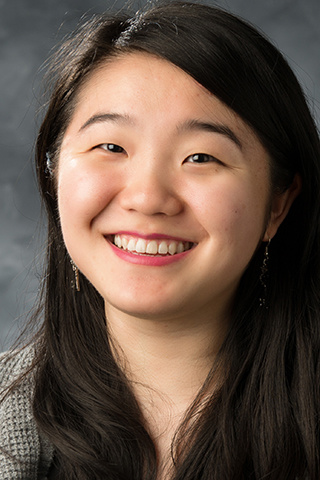
Wenqi Duan, graduate student, electrical engineering
Wenqi Duan was always good at math and physics, but when people asked what her future plans were, she knew she didn’t want to be stuck in a classroom or office.
That’s why she decided to pursue electrical engineering, where she could conduct experiments in a lab setting.
“In a lab, you’re working with your hands—you’re on your feet,” Duan says. “It definitely beats sitting in front of a computer, staring at a screen all day.”
At the UI, Duan makes solar cells out of silicon that the Department of Pharmacology modifies into biosensors. Then, she tests the solar cells for changes in light reflectivity and electrical charge that can indicate the presence of cancer cells. The idea, Duan says, is to learn how to manufacture these solar cells on a mass scale while keeping costs down.
“When I first thought about electrical engineering, I thought about being surrounded by circuits and circuit boards all day,” she said. “Coming here changed a lot of my perceptions. I do a lot more chemistry than I thought I would. And it’s all about the connections you make outside the lab as well, talking to different professors about how their work can blend into ours. For me, that’s one of the more exciting aspects.”
Duan’s advice for future female engineers: “If you walk into a classroom and see that you’re one of two girls in a class of 15, don’t ever let that stop you from doing what you’re passionate about.”
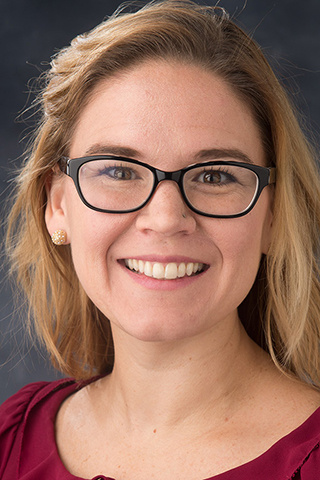
Sarah Vigmostad, associate professor, biomedical engineering
A naturally curious person skilled at math and problem-solving, Sarah Vigmostad says a career in engineering just fit.
“I definitely wanted to do something that I could see,” she says. “I didn’t want to do something theoretical; I wanted to do something that was applied, that I could see in some way.
Now an associate professor of biomedical engineering at the UI, Vigmostad researches how to use advanced computational tools and simulations to study blood flow and physiology—specifically how the body behaves under normal and diseased conditions. One of her biggest interests is how to improve medical-device design.
She says the best part about being an engineer is being able to ask interesting questions and coming up with new ways to answer those questions.
Vigmostad’s advice for future female engineers: “Don't think that an engineering degree will define your career path; an engineering degree will allow you to define your own career path. You can do almost anything with an engineering degree, and it will open up more doors than almost any other degree you can get.”
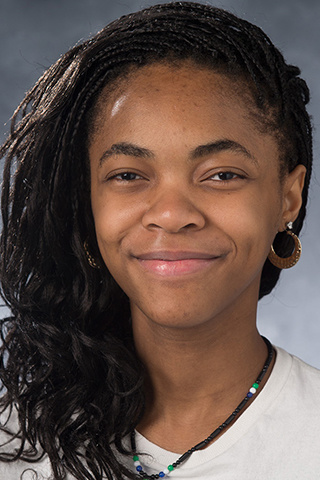
Mariama Corneh, junior, mechanical engineering
Mariama Corneh says her interest in science started with passionate teachers in middle school and high school who encouraged her to pursue the subject. When she was applying for colleges, they suggested engineering.
At first, Corneh says she wasn’t that enthusiastic. But then she learned about all of the creative projects engineers work on, such as helping, perhaps, to design the next big product.
“I thought that engineers just sat at their desks and only had one meeting every once in awhile,” she said. “But I’ve learned engineers are some of the most social and energetic people I’ve met in my entire life.”
Corneh says she enjoys being on a career path that will keep her in the know about the latest technologies and has the potential to affect world change.
Corneh’s advice for future female engineers: “Keep an open mind. No matter how smart you are, you’re going to fail a lot. Don’t let that stop you; take those situations and learn how you can apply them to the next one.”
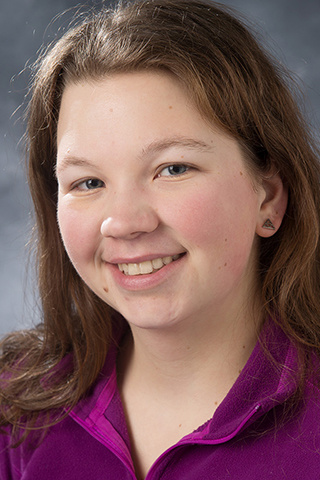
Michelle Riedinger, senior, civil engineering
Michelle Riedinger says she likes the tangible aspects of being a civil engineer, being able to point to a bridge and say, “I had a hand in that.”
Though her father is an engineer, she hadn’t seriously considered the career path until eighth grade, when she met a female engineer as part of a career project at school.
“It was reassuring that there were other female engineers,” she says.
Riedinger, from Naperville, Illinois, says growing up near Chicago and seeing all of the grand skyscrapers and bridges there inspired her to want to make them herself.
Now, she is president of the UI’s American Society of Civil Engineers, with which she competes in various canoe- and bridge-building competitions throughout the year. She also interns with the city engineers in Iowa City and hopes to find a job in Iowa after graduation because she says she has fallen in love with the area.
Riedinger’s advice for future female engineers: “Get involved in something and find other women that are in the field too. Someone pointed out to me last year that there’s a small number of women in my senior civil engineering class, but it doesn’t feel like it because I know all of them and sit by them in class.”
